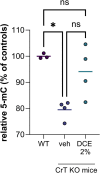Epigenetic alterations in creatine transporter deficiency: a new marker for dodecyl creatine ester therapeutic efficacy monitoring
- PMID: 38694899
- PMCID: PMC11062253
- DOI: 10.3389/fnins.2024.1362497
Epigenetic alterations in creatine transporter deficiency: a new marker for dodecyl creatine ester therapeutic efficacy monitoring
Abstract
Creatine transporter deficiency (CTD) is an X-linked disease caused by mutations in the Slc6a8 gene. The impaired creatine uptake in the brain leads to developmental delays with intellectual disability. We hypothesized that deficient creatine uptake in CTD cerebral cells impact methylation balance leading to alterations of genes and proteins expression by epigenetic mechanism. In this study, we determined the status of nucleic acid methylation in both Slc6a8 knockout mouse model and brain organoids derived from CTD patients' cells. We also investigated the effect of dodecyl creatine ester (DCE), a promising prodrug that increases brain creatine content in the mouse model of CTD. The level of nucleic acid methylation was significantly reduced compared to healthy controls in both in vivo and in vitro CTD models. This hypo-methylation tended to be regulated by DCE treatment in vivo. These results suggest that increased brain creatine after DCE treatment restores normal levels of DNA methylation, unveiling the potential of using DNA methylation as a marker to monitor the drug efficacy.
Keywords: cerebral organoids; creatine transporter deficiency; dodecyl creatine ester; epigenetic; methylation.
Copyright © 2024 Broca-Brisson, Disdier, Harati, Hamoudi and Mabondzo.
Conflict of interest statement
The authors declare that the research was conducted in the absence of any commercial or financial relationships that could be construed as a potential conflict of interest.
Figures



Similar articles
-
Dodecyl creatine ester improves cognitive function and identifies key protein drivers including KIF1A and PLCB1 in a mouse model of creatine transporter deficiency.Front Mol Neurosci. 2023 Mar 24;16:1118707. doi: 10.3389/fnmol.2023.1118707. eCollection 2023. Front Mol Neurosci. 2023. PMID: 37063368 Free PMC article.
-
Deciphering neuronal deficit and protein profile changes in human brain organoids from patients with creatine transporter deficiency.Elife. 2023 Oct 13;12:RP88459. doi: 10.7554/eLife.88459. Elife. 2023. PMID: 37830910 Free PMC article.
-
Dodecyl creatine ester, a promising treatment to deliver creatine to neurons, achieves pharmacology efficacy in creatine transporter deficiency.Eur J Med Chem. 2025 Feb 15;284:117195. doi: 10.1016/j.ejmech.2024.117195. Epub 2024 Dec 20. Eur J Med Chem. 2025. PMID: 39733481
-
The Creatine Transporter Unfolded: A Knotty Premise in the Cerebral Creatine Deficiency Syndrome.Front Synaptic Neurosci. 2020 Oct 23;12:588954. doi: 10.3389/fnsyn.2020.588954. eCollection 2020. Front Synaptic Neurosci. 2020. PMID: 33192443 Free PMC article. Review.
-
X-linked creatine transporter (SLC6A8) deficiency in females: Difficult to recognize, but a potentially treatable disease.Mol Genet Metab. 2023 Nov;140(3):107694. doi: 10.1016/j.ymgme.2023.107694. Epub 2023 Aug 30. Mol Genet Metab. 2023. PMID: 37708665 Review.
Cited by
-
An international questionnaire highlights and supports the case for including girls in Creatine Transporter Deficiency research.Front Neurosci. 2025 Jul 7;19:1620586. doi: 10.3389/fnins.2025.1620586. eCollection 2025. Front Neurosci. 2025. PMID: 40692578 Free PMC article.
References
LinkOut - more resources
Full Text Sources
Other Literature Sources

